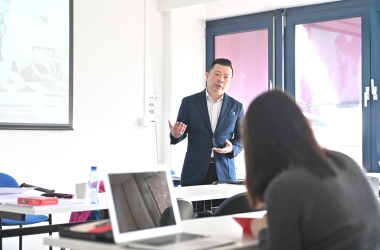How to Design Better Assessments: Session Outlines Importance of Constructive Alignment

Dadi Chen Delivers Guest Lecture Targeted at Education Professionals
On 14 May, Wittenborg Deputy Head of the School of Business Dadi Chen delivered the guest lecture ‘Constructive Alignment in Practice: Designing Assessment for Business Modules’, as part of the school’s Postgraduate Certificate (PGCert) Programme in Teaching and Learning in Higher Education. The activity was conducted in a hybrid format and attended by lecturers participating in the PGCert Programme, as well as other Wittenborg education professionals.
During the session, Chen outlined the Constructive Alignment framework, which emphasises the importance of aligning teaching and learning activities, assessment methods and intended learning outcomes. Among other topics, he highlighted that assessment demands should be designed so as to orient students to distribute appropriate amounts of time and effort across all the important aspects of the course. Moreover, the guest lecture discussed the role of feedback in learning, the elements of assessment design and the different types and purposes of assessments. The session also included a discussion on current assessment practices at Wittenborg and delved into how Artificial Intelligence (AI) powered technologies impact constructive alignment.
According to Chen, lecturers need to be mindful of the quality, reliability and level of difficulty of the exams they design. “Throughout my career, I’ve encountered situations such as multiple-choice questions being used to test higher-order learning, assessment workloads that don’t align with students’ available study time and even typos and grammatical errors in exam questions. Moreover, examiners are now challenged to verify the authenticity of students’ learning in an AI-powered world. These are just some of the reasons why lecturers must pay closer attention to assessment practices and continuously seek improvement in this area,” he said.
The Deputy Head of the School of Business commented that the session was very productive, with participants being actively engaged. “They reflected critically on how they manage assessments and contributed significantly to the discussion about what needs to be improved at Wittenborg to increase the effectiveness of our assessments.”
Wittenborg associate professor Gabor Molnar was one of the participants of the activity. According to him, the outcome was positive. “I enjoyed being part of the session; it was engaging and highly relevant to my teaching practice. Dadi's guest lecture offered valuable perspectives on how to rethink assessments in a way that not only embraces AI tools but also ensures that students continue to develop essential cognitive skills. It also reminded me of the importance of designing assessments that align with teaching objectives and support ongoing student development.”
For Wittenborg associate professor Cha-Hsuan Liu, who also attended the workshop, lecturers often focus on developing their teaching skills by attending courses but tend to overlook assessment design. “Assessments are a very powerful tool to connect with students’ learning processes and help them improve. Nowadays, we’re dealing with the emergence of AI, and to effectively evaluate students’ critical thinking, we need to design new strategies, such as hands-on case studies. I joined this workshop to learn from Dadi and the other participants, and also to share my own perspectives. It was a great session, and since it was recorded, other lecturers will have the opportunity to watch it.”
WUP 03/06/2025
by Ulisses Sawczuk
©WUAS Press